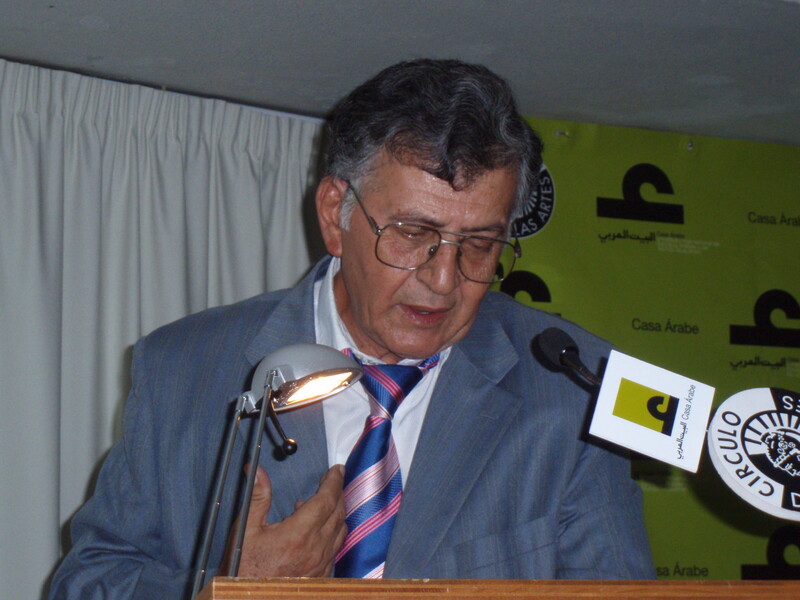Arts and Culture 21 November 2014

Samih al-Qasim, a poet who endured decades of Israeli repression, pictured during a visit to Spain. (Wikimedia Commons)
An author and translator from Palestine are among four literary figures honored in the 2014 King Fahd Center for Middle East Studies Translation of Arabic Literature Award.
The award, which is co-sponsored by the King Fahd Center at the University of Arkansas and Syracuse University Press, includes a cash prize for the writers and translators but – perhaps more importantly – publication for the translated titles.
This year’s first winner was All Faces but Mine, a collection of poetry by Samih al-Qasim, which sadly comes just months after the great man’s death. A press release from Syracuse UP, which announced the awards, described al-Qasim as:
part of the flourishing of Palestinian “resistance literature,” along with Mahmoud Darwish, Tawfiq Zayyad, and later Taha Muhammad Ali. He ensured that the voice of Palestinians within Israel continued to be heard. He wrote for major publications such as al-Jadid and al-Ittihad, and managed the Arabesque publishing house in Haifa.
Al-Qasim was jailed by Israel and placed under house arrest many times for his political activism. His son Wadih was also jailed for refusing to serve in the Israeli military, and Samih al-Qasim remained outspoken on Palestinian issues as well as those of the Druze religious minority until the end of his life.
The anthology was translated by Abdulwahid Lulua, an Iraqi writer based in Britain whose previous translations have won a range of other literary prizes.
Exploring translation together
The second volume co-awarded this year’s prize is The Perception of Meaning by Jordanian author Hisham Bustani, who has written several novels as well as political commentary on Jordan, Palestine and the Arab uprisings. Bustani’s challenging writing has been described by one literary magazine editor as:
evad[ing] conventional genre designations, like poetry, fiction and nonfiction. The piece functioned as a hybrid, which challenged us and ultimately resulted in its acceptance. Further, the translated language was powerful, violent, emotionally charged, beautiful and mysterious.
The book’s translator, Thoraya El-Rayyes, is a Palestinian-Canadian writer based in Jordan, who has until now focused mainly on short stories. A recent joint interview with both Bustani and El-Rayyes appeared on the Arabic Literature (In English) blog, in which El-Rayyes commented that:
In general, I find the biggest challenge in translating from Arabic into English to be the different word order in the two languages. The way that Arabic sentences are structured creates a kind of tension which is hard to translate into English. I think this is because Arabic sentences tend to begin with action — or in other words a verb — and the reader has to continue reading for the subject and object to be revealed. This creates a kind of suspense in the act of reading the sentence that can be hard to translate into English which has a subject-verb-object sentence structure.
Several of Bustani’s short stories translated by Thoraya El-Rayyes have appeared online, including Nightmares of the City and History Will Not Be Made On This Couch, which is dedicated to “To the revolutionaries of Egypt who left their couches and burnt their televisions.” The latter also forms part of the prize-winning novel, another excerpt from which, entitled “Apocalypse Now,” can be heard read by Bustani in a video:
Tags
- Samih al-Qasim
- poetry
- translation
- Druze
- Wadih al-Qasim
- refuseniks
- King Fahd Center
- University of Arkansas
- Syracuse University Press
- Arabic Literature In English
- resistance literature
- al-Jadid
- al-Ittihad
- Arabesque
- Mahmoud Darwish
- Tawfiq Zayyad
- Taha Muhammad Ali
- Abdulwahid Lulua
- Hisham Bustani
- Jordan
- Thoraya El-Rayyes
- Amman
- literature





